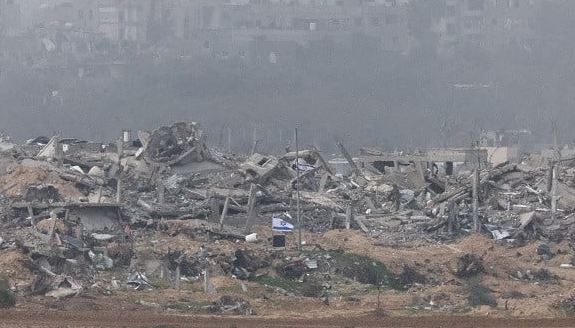GAZA: Israel bombed areas of Jabalia in the northern Gaza Strip overnight, with fighting throughout Sunday morning, residents and Palestinian media said, as the Israeli military announced a mounting death toll in clashes with Hamas fighters.
Israel claims it has achieved almost complete operational control over northern Gaza and is preparing to expand a ground offensive to other areas, but Jabalia residents reported persistent aerial bombardment and shelling from Israeli tanks, which they said had moved further into the town on Saturday. Resistance fighters continue to mount attacks in areas Israel claims control over.
The Israeli military appeared to be meeting stiff resistance. It said on Sunday eight soldiers had been killed in the Strip, bringing to 154 its published combat losses since its ground invasion started.
The White House said US President Joe Biden and Israeli Prime Minister Benjamin Netanyahu had discussed the Israeli campaign.
Israeli strikes in Gaza killed more than 200 people in 24 hours, said Gazan authorities.
Biden “emphasised the critical need to protect the civilian population including those supporting the humanitarian aid operation, and the importance of allowing civilians to move safely away from areas of ongoing fighting”, the White House said in a statement.
“The leaders discussed the importance of securing the release of all remaining hostages,” the White House said.
Netanyahu “made clear that Israel will pursue the war until all of its objectives are fully met”, his office said.
Despite growing calls for restraint and for more aid to reach war-stricken Palestinians, Israel showed little sign of modulating its 11-week-old “Operation Swords of Iron” — which aims to rout Hamas.
Fighting is now centred on Gaza City and the southern city of Khan Yunis, both considered strongholds of the Palestinian resistance group.
After reports of heavy Israeli shelling, grey and black smoke rose over the north of the besieged coastal territory and in Khan Yunis.
The refugee camp-turned-city is the birthplace of Yahya Sinwar, Hamas’ leader in Gaza and the man Israel holds most responsible for the October attacks.
The Israeli Army chief of staff, Herzi Halevi, visited troops on the ground in Khan Yunis, telling them that the operation had been “very impressive, truly very impressive, both the attack here and carrying out the operation in a secure manner”.
Outside a morgue at the city’s Nasser Hospital, grieving relatives prayed, wept and stared vacantly as they tried to process incalculable loss.
Palestinian authorities said the death toll from this war has now surged beyond 20,000.
“This is a genocide,” said resident Rafat Al Aydi.
Netanyahu, Israel’s longest-serving prime minister, has had testy relations with a string of US presidents. But disagreements over how the Gaza war is being prosecuted, when it will end, and what happens the day after, have strained ties even further.
On Friday, the United States allowed the passage of a UN Security Council resolution that effectively called on Israel to allow “immediate, safe and unhindered” deliveries of life-saving aid to Gaza “at scale”.
World powers had wrangled for days over the wording, and at Washington’s insistence toned down some provisions — including removing a call for a ceasefire.
UN Secretary-General Antonio Guterres has accused Israel of “creating massive obstacles” for aid deliveries.
For Palestinians in Gaza’s southern city of Rafah, the prospect of aid alone was not enough. “We don’t want food, we want a ceasefire,” said Mahmud al-Shaer.
Ahmad al-Burawi, who was displaced from Beit Lahia further north, added: “We just want to return to our lands, that’s all. We want a solution” to end the war. “People are dying,” he said.
The war has displaced about 80 percent of Gaza’s 2.4 million population, according to UN estimates.
Israelis, including friends and relatives of the 129 captives still believed held in Gaza, demonstrated again on Saturday in Tel Aviv.
Hamas’s armed wing said it “lost contact” with fighters tasked with guarding five of the captives, including three elderly men who appeared in a hostage video the group released this week.
“We believe that those hostages have been killed” in Israeli strikes, said spokesman Abu Obeida. Talks aimed at resuscitating a truce and prisoner swap appeared to be stalled.
An earlier truce allowed 80 Israeli captives to be released in exchange for 240 Palestinian prisoners, but ended after one week.
Far from Gaza, a new attack on shipping Saturday showed the war is already spilling over into the broader region.
Maritime agencies said a drone strike damaged a chemical tanker in waters off Veraval, India. There was no claim of responsibility, but the Pentagon said it was a “one-way attack drone fired from Iran”.
Yemen’s Houthi fighters have repeatedly fired drones and missiles at ships in the Red Sea, saying they are targeting Israeli-linked vessels in solidarity with Gaza.
Iranian deputy foreign minister Ali Bagheri on Saturday said the Houthis act on their “own decisions and capabilities”.
There also have been cross-border skirmishes between Israeli forces and Lebanon’s powerful Hezbollah movement.

















